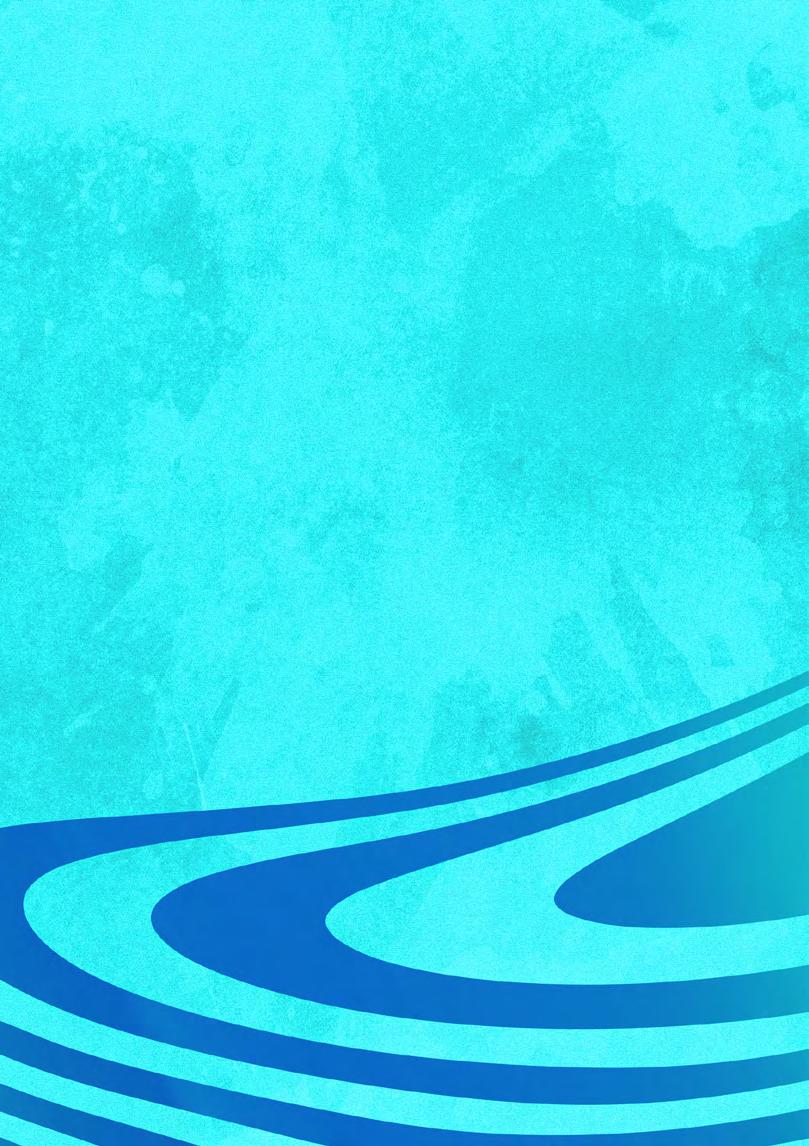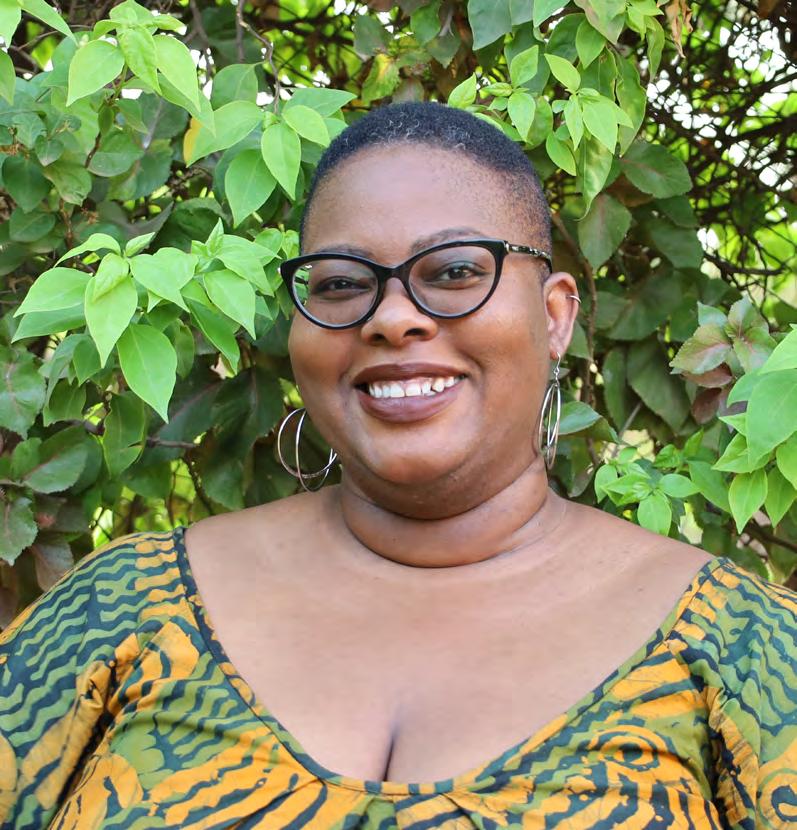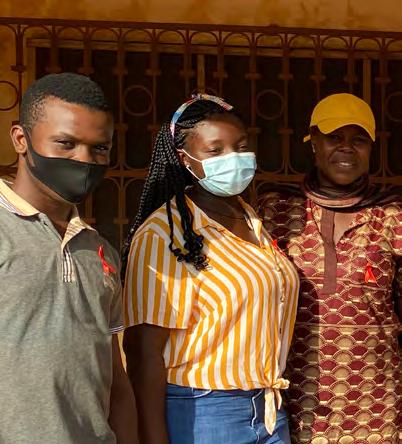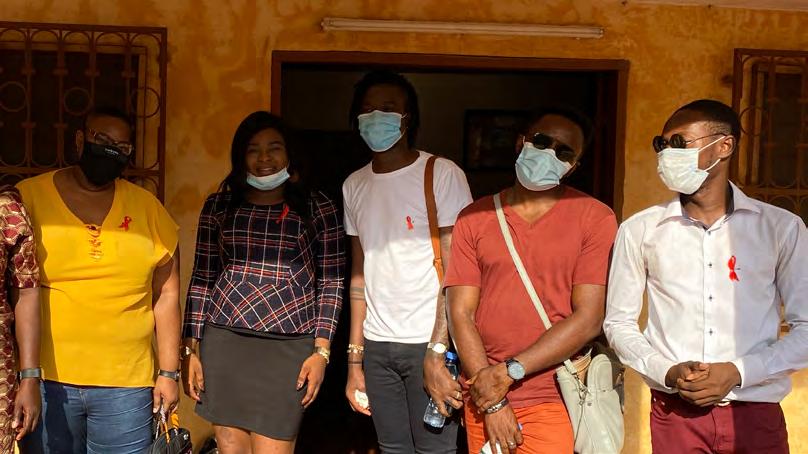
11 minute read
WORKING THROUGH A GLOBAL PANDEMIC
A chat with ISDAO’s Executive Director, Caroline Kouassiaman and ISDAO’s Director of Programmes, Olumide Makanjuola on how the Covid-19 pandemic affected our work at ISDAO, how we adapted externally and internally and worked with grantee-partners to adapt.

Advertisement
Question 1: How has the coronavirus and subsequent health policies and travel restrictions implemented across the region affected ISDAO’s operations and finances?
Caroline: As with most organizations, the pandemic had a significant impact on our work, including limiting our ability to travel and conduct site visits; not being able to host our planned grantee forum (in 2020); having to move more meetings online in a region with significant challenges and barriers for many around internet access and reliability; and delays or cancellations of many of the key meetings and strategic spaces (such as Pan-African ILGA Forum) that we had planned to engage in or organize. It has not been possible for ISDAO to organize any inperson meetings of the Governing body in the last year, which slowed the processes around transitioning to a permanent governing body. Our grant-making processes took much longer than usual, especially during the months when most countries were on lockdown. Our in-person visits, which are critical for relationship-building, due diligence, identifying capacity needs but also for understanding the contexts in which activists are working in, and for building ISDAO’s visibility in the region, had been to be significantly limited or shifted, especially in 2020.
Fortunately, the majority of ISDAO’s funders are flexible and responsive donors who also provide general operating support for our work. They also believe in the long-term vision and mission of ISDAO, and in the importance of supporting the organisation overall. So, this helped quite a bit. We, fortunately, did not face any cuts in funding, and our funders maintained their commitments to ISDAO. In addition, four of our funders provided us specific funding to help address any emerging issues that were arising both for ISDAO and for our grantee partners in the context of COVID-19.
As several recent reports have highlighted, including the most recent Global Philanthropy Project report, Outright International’s report on the impacts of COVID-19 on LGBTQI organizing, African Queer Youth Initiative’s report on impacts on LGBTQI youth, the context put additional pressure and strain on community organizations, including most of our partners, who had to halt, pause or pivot from their ongoing work, and stretch resources to also provide humanitarian assistance to community members. Moreover, the economic impacts of COVID-19 have also significant and felt throughout our region, as the overall costs of operating and the costs of living have increased significantly.
Question 2: What strategies did you implement to adapt internally and externally to changing circumstances?
Caroline: As the Executive Director, I felt it was important for us to have a comprehensive plan that we would use to guide us, and which we would review and evaluate and adjust every 2-3 months. It was clear that the context was continuously evolving, even from one day to another, and that it also looked different in each country, especially between March and June/July, where most of the countries went on lockdown or had significant restrictions around movement. While the team already worked remotely, the shift to working exclusively from home and dealing with everything else moving online was a challenge for many of us. So, it was important to try to build and sustain a culture of “checking in” with each other. It’s also during this time that we also started our weekly virtual coffee breaks to create time to check in on each other. Flexibility around work hours and space has always been important for me, and I made sure that we maintained this.
Question 3: What are the major challenges that ISDAO’s grant-making partners have faced as a result of the pandemic?
Olumide: The pandemic and the lockdowns around the world reminded us of some of the biggest challenges that our communities face within the region. We were reminded about the impacts of economic inequalities, the systematic disenfranchisement of our communities and the impacts of social rejection. During the lockdown, LGBTQI+ persons in the region were unable to access the services that they needed because community organisations were closed. The safe spaces that are provided by many organisations were shut down due to Government restrictions on public gatherings, closure of non-essential services and other pandemic related restrictions. This meant that people were forced to stay in spaces that humiliated, traumatised, and discriminated against them. Our granteepartners had to find ways to adjust and meet the needs of their communities while trying to sustain the operation of their organisations. Through our engagement, we were reminded that one of the biggest challenges that organisations face in the region is a lack of access to core funding and/or flexible funding. While many organisations had project funding, they struggled to find core funding to sustain their operations, especially with increased costs like providing internet for the individual staff working from home and buying personal protective equipment (PPE). These increased costs were barely covered by their existing grants which were mostly project-focused. In addition, many of our grantee partners were forced to also become social welfare support systems to their community members who were faced with challenges around their incomes and ability to work and had no access to Government support. In places where the Government provided social support, such support was not made accessible to the LGBTQI+ communities. These new realities required our grantee partners to provide support to persons who were faced with the highest levels of social needs, providing food, money and housing support to them.
Question 4: As an already flexible funder, how did ISDAO further support its grantee-partners and community to help them adapt to the crisis?
Olumide: At ISDAO, we understood the importance of flexible resources and how they can support organisations to take the necessary action as the context of their work evolves. With this understanding, at the start of the pandemic, we notified our grantee-partners that they were allowed to redirect their resources as their contexts evolved to meet the needs of their communities. We also provided room for our grantee-partners to request extensions for their report submissions where needed. We were keen to ensure that the administrative burden on our grantee-partners was reduced and that our partners could focus more on meeting the needs that were evolving daily for their communities.
We also created a new fund, our Resilience Grant, to provide additional support for our grantee-partners as needed. The Resilience grants enabled us to provide additional funding to partners to cover costs such as office rent, staff salaries or stipends, internet, and other related costs. This was our way of extending additional support to our partners in response to the covid-19 pandemic.
We also ensured that we shared all available funding opportunities to partners, especially opportunities that were providing emergency funding to offset the impacts of the COVID-19 pandemic and opportunities funding for community support. To support them further, we provided references to grantee-partners that were trying to access resources from other donors. Many of our partners were able to secure additional funding to support their needs.
Question 5: What type of civic engagement did ISDAO carry out in response to the coronavirus?
Caroline: In addition to the measures that Olumide spoke to, we were quite engaged in different philanthropic spaces around this context, and used our presence and our voice to share with other funders and international partners about the context and impacts on LGBTQI communities and organizations, as well as the need for them to be a part of COVID-19 response funding and planning. In April, we posted a reflection piece on the ISDAO blog about the importance of not using the COVID-19 context to further stigmatize individuals. In 2020, we spoke about the context and impact on LGBTQI communities and organizing in West Africa in panels hosted by Funders Concerned About AIDS (FCAA), Global Philanthropy Project, UNAIDS/ECOWAS West African Health Organization, African Grantmakers Affinity Group, amongst others. One of the sessions that stood out to me the most was the one with UNAIDS/ECOWAS, which was a 2-day virtual conference in July. Most of the presentations were by representatives from UNAIDS country programs and national HIV departments across ECOWAS, with a short time slot for a few regional civil society organizations. Much of the presentations focused on the numbers – how countries were keeping up with the 90-90-90 targets by doing things like providing 3-month stocks of ARVs, doing home delivery of ARVs, more mobile testing, etc. Some country representatives also spoke about providing some emergency assistance to ‘Key Populations’, including food and PPE, but none spoke about the role that community organizations were playing in the response, and the need to bolster support to communityled organizations during this time! This was an important space for us to be in, to remind them about why it was important to strengthen the leadership, resilience and response of LGBTQI groups and organizations, and provide practical recommendations for how to do this. Throughout 2020, in such spaces, we continued to provide perspectives and voices that were often missing from critical conversations.
Question 6: Would you say the pandemic had a major effect on the NGO/Philanthropy landscape in terms of flexibility, especially in West Africa?

Caroline: That’s an interesting question. I think that the pandemic has highlighted the need and that the funders who were/are the most flexible were already flexible before the pandemic. There was an interesting research that was produced by the Global Philanthropy Project that is important to note – while LGBTQI funders have been flexible overall, and have maintained or increased funding overall in the context of the COVID-19 pandemic, there is a huge gap with humanitarian funders (which are the main source of COVID-19 response) in terms of inclusion of LGBTQI communities. Again, what we are seeing is that those funders who are already there, who are already the most flexible have maintained or increased their commitments, but the biggest gaps remain around other sources of funding and support, including amongst humanitarian funders and HIV funders.
The major hurdle remains many of the HIV funders, which is the greatest source of funding for LGBTQI organizing across West Africa. The continued emphasis on targets and numbers -- despite the clear evidence that we must significantly address criminalization, discrimination and the human rights context to have a sustained impact on HIV – shows that there is work to do to improve this landscape. In one of my site visits in 2020, I met with one of our partners who spoke about how now, in the context of COVID-19, they have to do peer educator outreach in several groups of 10-15, whereas before they could meet 30 people at a time. So, greater costs for doing their work and more time needed, but the targets and resources for this work had not shifted. In addition, they spoke about how some of the most pressing needs were around psycho-social support and counselling, especially for community members who were confined in spaces that were not safe for them – but not being able to pivot their funding to address this.
Question 7: What is your biggest learning from 2020?

Olumide: Providing organisations with flexible funding is a key solution to sustain local movements and collective action in the region, especially as our movement is faced with constant crises that can limit their support to communities where funding is not flexible. We have already seen how flexible funding allows organisations to immediately respond to the needs of their communities as they evolve. In addition, 2020 reminded us of the importance of funding proactively rather than reactively. We were reminded that proactive funding can help build, sustain, and support movements for collective action. We were reminded that core funding is just as important as project funding.
Caroline: It was important as we were building the COVID-19 plan to not only look at the shortterm, but also the longer term. Not to underplay the disastrous impacts of this pandemic, but this is not the first emergency or humanitarian crisis that we have faced in the region, and it will not be the last. What is key is how we learn from it, and use this to be better prepared and resilient, both as an organization, as a funder, as a movement. For me, the biggest learning is three–fold: (a) the importance of building resilient organizations (both for ISDAO and for our grantee partners) to have the ability, space and resources to pivot as needed, to strategize/reflect on what needs to shift and to withstand such shocks – this also means that we have to start having real conversations (and commitments!) as funders about economic resilience and security, and sustainability and what it means to support this; (b) as we were already practising, another form of organizational structure can exist and be effective – the traditional one physical office is not a requirement for all, and there are other ways to organize, and; (c) virtual spaces and digital tools are useful, important, necessary and valuable, but not sufficient.








